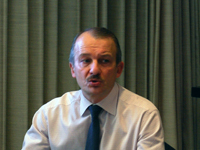Registration
Thank you!
You will receive an email confirming your registration.
IMGXYZ3311IMGZYXPutin’s expected return to the presidency in early 2012 comes at a time of great economic uncertainty. Although Russia’s economy is stable at the moment, Russia will have to modernize in order to remain stable and competitive in the long run. Carnegie hosted Carnegie Moscow's Sergei Aleksashenko, former deputy minister of finance of Russia and former deputy governor of the Russian central bank, for a roundtable discussion on the challenges facing the Russian economy. Carnegie’s Matthew Rojansky moderated the discussion.
Warning Signs
- A Fragile Economy: The 2008 global financial crisis exposed the vulnerability and unhealthy growth of Russia’s economy, Aleksashenko said. Russia remains heavily dependent on the export of oil and natural gas and its labor force lacks production and technological expertise. More than 85 percent of Russian exports are raw materials and primary commodities. There is widespread agreement among elites that the economic status quo is unsustainable, he concluded.
- A Costly Oil Industry: Aleksashenko noted that Russian oil companies have been forced to search for new oil sources in remote regions of northern and eastern Siberia where initial production costs are much higher. As oil extraction becomes increasingly difficult and more expensive, Russia will have to seek other alternatives to keep its economy afloat.
- Demographics: Population decline represents another serious threat to Russia’s economy, Aleksashenko argued. In 2015-2025, a shrinking (and aging) population and labor force could likely result in a “demographic trap” that would stall economic growth. A greater influx of migrant laborers from Central Asia – the backbone of Russia’s industrial work force – will not solve the problem, he added.
- Pensions: An aging population has increased the “pension burden” on the Russian economy, noted Aleksashenko. Rosstat predicts that by 2030 Russia will gain 9 million pensioners while the working age population will shrink by 11 million. Discussion of pension reform will likely follow the 2012 election, and it will remain a major issue in the long-term, he said.
The Need for Reform
- Poor Investment Climate: Russia’s investment climate has become much less attractive as investment capital continues to leave the country, Aleksashenko said. In developing economies, investments typically account for 25-30 percent of GDP, but in Russia investments are only 21-22 percent of GDP. He argued that political reform and economic modernization are the keys to improving Russia’s investment climate.
- Democratization: State racketeering, corruption, and weak rule of law are major hindrances to Russia’s economic development, argued Aleksashenko. Despite the fact that Russia has what he described as a “driven entrepreneurial population,” many feel unprotected under current laws. He noted that Russia needs better law enforcement, an independent judiciary, protection of property rights, and more foreign investment in order to transform its economy, but Putin is reluctant to implement such serious political reforms. “Growth is not an economic but a political problem in Russia,” he concluded.
